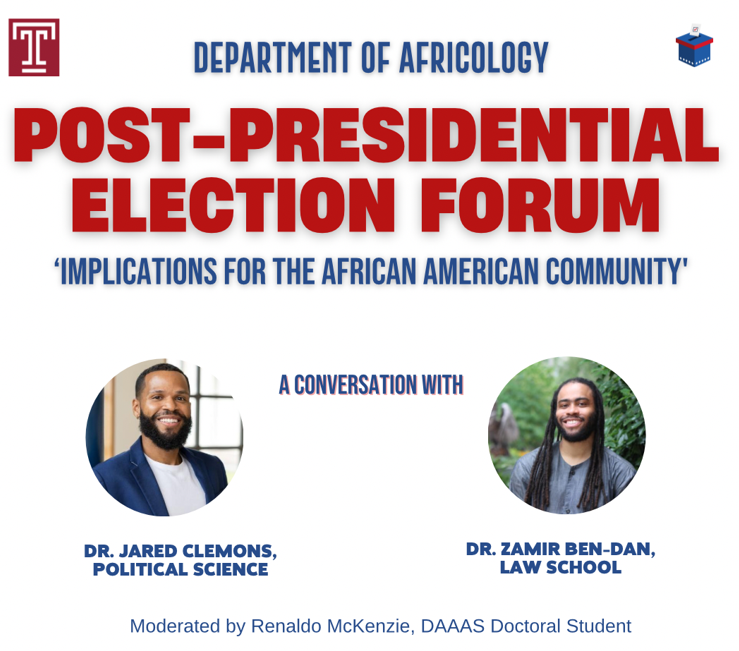Department of Africology and African American Studies
Panel Discussion on “The Impact of US Elections on African Americans”
Moderator: Rev. Renaldo McKenzie, PhD Student, Author of Neoliberalism.
Chairman: Dr. Ama Mazama
Date: 11.05.2024

Format and Flow
-
Opening Remarks:
What has been the impact of US Elections on African Americans? The question is important and suggest a problem that requires redress which is supplied by the question, Elections. The location is the United States of America, that is a multi-cultural society based on constitutional rights and freedoms, democracy and on the ideal that all men are free and therefore has equal opportunity. However, it is also a place that is the hallmark and zenith of White supremacy, European domination and invention that embraces the ideals that put African American at odds with themselves and their achievements. African Americans have a genesis in these US that involved a violent dehumanization of a people who for years have endured enslavement. Through successive efforts with the help of white Christians and politicians, they were able to obtain some humanity and equality but at the expense of supplanting their hopes, dreams, and cultural identity, while still trapped at the bottom within a racialized society based in a capitalist class system.
Since 1776, and the elections that ensued, African Americans have slowly garnered certain freedoms through persecution, martyrdom, and internal strife. Today a woman who identifies as African American and south Asian is VP and running for President. Is that progress within the mindset of African Americans? Or does it provide an opportunity for even greater change towards developing more African institutions and restoring African culture and history, changing language, and raising Africa to the level of Greece and Europe? Would this create agency among African Americans to better their lives?
The true question is, as Africologist, or academics, should we even ask the question about elections, as the true answer is within the consciousness of the African himself or herself? Which requires the building of agency that is only developed within an African center that is achieved through policy focused on again the restoration of Africa as the starting point. Is there political will to do so? To rewrite history to begin to instill a consciousness within Africans to start working in concert for change?
Many African Americans we spoke to, whom we asked about the impact stated that African Americans are being used to secure an unfair powerbase of white rich men. Some respondents stated that if they do lead, they are only puppets of the wealthy. They continue the same policy that has not helped African Americans: During Trump African Americans were gunned down without any support from the President. Many feel that Obama was a fiscal conservative but refused to highlight any policy to advance African Americans who continue to ravage from unfair healthcare regime and the economic crisis from Bush.
Have the civil rights, and voting rights, DEI and affirmative action, sentencing reforms, Obamacare, social welfare, economic advancement opportunities, black studies and loans are these enough to say that African Americans have benefitted or impacted from us elections?
In places where African American lives there are still de jure and de-facto ways of discrimination with high levels of crime and violence, poverty and lack of investments with a heavy dependence on social welfare and aide. What has been the policy and effectiveness of elected officials to address these and what does the data suggest?
According to Lanier Guinier, the electoral process fails because they fail to provide adequate representation. Is this a fair criticism or is it another discriminatory tactic and is there any truth to it?
What specific policies have there been to help uplift African Americans economically, given the history of discrimination? What about the removal of affirmative action and plans to ban Critical Race Theory?
How does the political system countervail the goals and effective and revolutionary change for the African American?
We will delve into these today. Today we have with us two panelists who will help us to explore this question and invite comments and questions from the audience.
If you have any questions, please raise your hands to be notified.
- Panelist Introductions: Brief introduction of each panelist, their background, and relevant expertise.
- Moderated Questions: Below are the suggested questions, covering a range of political, economic, and cultural impacts.
- Audience Q&A: Open for questions from the audience.
- Closing Remarks: Summarize key takeaways and any potential action points.
Questions
- Historical and Structural Impact
- What has been the impact of U.S. elections on African Americans historically?
Follow-up: How has this evolved from post-Civil Rights Movement elections to recent administrations, and does this history align with progress narratives, or does it suggest recurring systemic limitations?
- Progress or Symbolism?
- With Kamala Harris, an African American and South Asian woman, serving as Vice President, is this symbolic progress, or does it signal genuine political and social advancement for African Americans?
Follow-up: Do such high-profile roles truly shift policies to benefit African Americans, or is there a risk of tokenism without substantial change?
- Electoral Process and Representation
- Civil rights lawyer Lani Guinier argues that the electoral process fails to provide adequate representation for African Americans. Do you believe this is a fair criticism, and how does it apply in today’s political climate?
Follow-up: Are there alternative electoral structures, like ranked-choice voting or proportional representation, that might better serve African American communities?
- Policy Impact and Economic Disparity
- How effective have policies like the Voting Rights Act, Affirmative Action, DEI initiatives, and Obamacare been in addressing economic and social disparities for African Americans?
Follow-up: With recent attacks on Affirmative Action and Critical Race Theory, how could these shifts impact African Americans’ socioeconomic status and political power?
- Crime, Poverty, and Urban Investment
- In areas with large African American populations, high rates of poverty, crime, and limited investment are common. Have recent election outcomes led to effective policies that address these issues?
Follow-up: What does data suggest about the correlation between elected officials’ actions and improvements in these communities?
- The Role of Agency and African-Centered Consciousness
- Some argue that political empowerment for African Americans begins with a consciousness rooted in African identity and heritage. Should policies focus on fostering a cultural consciousness as a basis for African American empowerment, and is there political will for such policies?
Follow-up: Can fostering African-centered institutions or education contribute to better representation and agency within the political system?
- Economic Opportunities and Systemic Challenges
- What specific economic policies have been effective in uplifting African Americans, considering historical discrimination?
Follow-up: Given the recent economic challenges and a history of exclusion from generational wealth-building opportunities, is there room for transformative policies like reparations or investment funds targeted at African American communities?
- Media and Political Narratives
- How has the media shaped African Americans’ perceptions of political figures and policies, and what role does it play in influencing voting behaviors and policy support?
Follow-up: Do you see a bias in how African American issues are presented, and what impact does this have on actual policy outcomes?
- Future Directions in African American Political Engagement
- Looking ahead, how can African Americans leverage their voting power to drive more significant policy changes? Are there any current movements or leaders effectively channeling this potential?
Follow-up: How can African American communities build coalitions or use collective agency to push for long-term structural changes?
Vote of Thanks
Adjournment
Note: Some of the questions were adapted from interviews we did among African Americans at Temple University and in Philadelphia communities between 10.25 – 11.04.2024.

Submitted by Renaldo McKenzie, Content Creator and Chief, The Neoliberal Corporation
Live Video Excerpt of The Event:

